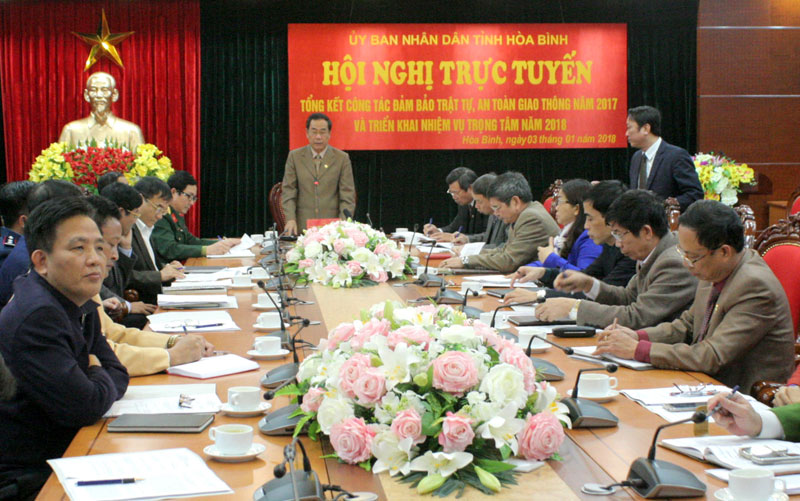
(HBO) – Vice Secretary of the Hoa Binh provincial Party Committee and Chairman of the provincial People’s Committee Nguyen Van Quang, who also leads Hoa Binh’s traffic safety board, has chaired a teleconference to review the traffic situation in 2017 and set tasks for 2018.

Chairman of the Hoa Binh Province People’s Committee Nguyen
Van Quang gives instructions on traffic safety ensuring in 2018.
Thanks to strong efforts of all-level authorities
and relevant sectors, the traffic situation in Hoa Binh was improved in 2017.
The province recorded 102 traffic accidents last year which killed 78 people
and injured 79 others. The respective figures declined by 11, 14 and 4 from
2016. There were no particularly serious accidents. Up to 73 percent of the
accidents were reported on national highways while 60 percent of the total
cases involved motorbikes.
The accidents were mainly caused by road users’
defiance of traffic rules when they speeded, abused alcohol, and moved in wrong
lanes. Meanwhile, not wearing helmets was a major cause of death in motorbike
accidents.
Officials at the event noted in 2017, provincial
authorities also made drastic moves to address flood consequences in order to
ensure traffic safety. While the management of vehicles and drivers was
improved, patrols and settlement of traffic rule violations were carried out in
a regular manner.
Hoa Binh aims to reduce the numbers of
accidents, deaths and injured people by at least 5 percent in 2018.
Speaking at the conference, Chairman of the
provincial People’s Committee Nguyen Van Quang asked the local political system
to bring into play its role in steering traffic safety ensuring work. They need
to reform communication contents and methods to raise public awareness of
traffic rules, promote state management of traffic safety ensuring, and step up
the protection of traffic infrastructure.
They should also increase coordination among
relevant forces, launch patrol campaigns to control and strictly deal with
violations, especially those relating to passenger transportation and oversized
and overloaded vehicles. Authorised agencies also need to make efforts to
ensure traffic safety throughout the Lunar New Year holiday and spring festivals,
he added./.
The Standing Board of the Hoa Binh provincial Party Committee has agreed in principle on a proposal by the Standing Board of the Party Committee of Hoa Binh city to gather feedback on the city’s 1:2000 zoning plan, which forms part of its broader urban development strategy.
Hoa Binh province has made notable progress in public administration reform and digital government development, with the satisfaction index among citizens and businesses reaching over 84%, according to recent government evaluations.
Thanks to great efforts by local authorities in recent times, the governance and public administration performance of Mai Chau district has been significantly improved.
In the afternoon of June 6, the Party Committee, the People's Council, the People's Committee and the Fatherland Front of Lac Son district solemnly held a meeting to celebrate the 139th anniversary of the district's founding (1886–2025) and the 79th anniversary of the establishment of the district's Party Committee (1946–2025). There was the attendance of Mr. Bui Van Thang, the Vice Chairman of the Provincial People's Council; Mr. Quach Tat Liem, the Vice Chairman of the Provincial People's Committee; Ms. Dang Bich Ngoc, the Deputy Head of the National Assembly Delegation of the province; as well as the former leaders of the province and district through various periods, who are the natives of the district.
Implementing the Politburo’s Resolution No. 57-NQ/TW on breakthroughs in science – technology, innovation, and digital transformation is a golden opportunity for the northern mountainous province of Hoa Binh to renew growth model, improve competitive edge and shorten digital gap.
Resolution 57-NQ/TW, issued by the Politburo on December 22, 2024, identifies sci-tech, innovation, and digital transformation as strategic breakthroughs to build a developed and prosperous nation. In Hoa Binh province, this spirit is not just a slogan, it’s being put into action through concrete initiatives that form a "new development triangle”: digital citizenship, digital economy, and digital administration.



